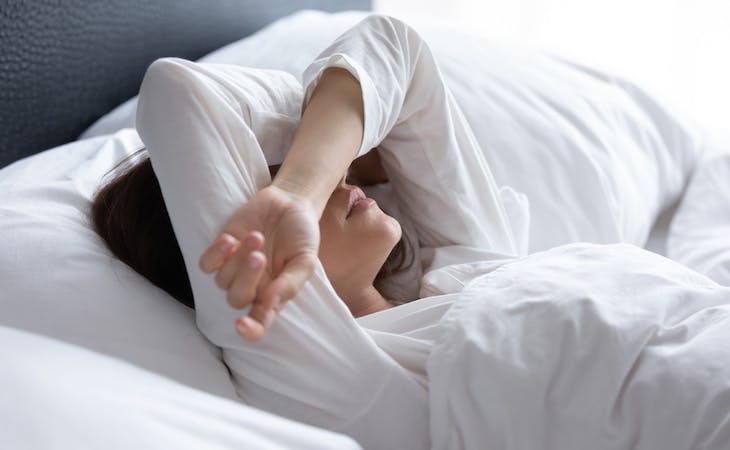A new study finds far fewer of us get the sleep we need.
Rather than the usual estimate of three in 10 Americans failing to get proper sleep, this new study reveals a whopping seven out of 10 people in the country aren’t enjoying the benefits of a full night’s restorative sleep. Interestingly, those who are over age 60, widowed, and retired are more likely to get restorative sleep.
About the study
Using a nine-item “Restorative Sleep Questionnaire (REST-Q),” the study published in the scientific journal Frontiers in Sleep assessed a nationally representative group to gauge Americans’ sleep satisfaction based on their sense of sleep restoration, rather than the prevalence of sleep disorders or duration.
Led by Rebecca Robbins, PhD, an instructor at Harvard Medical School and associate scientist at Brigham and Women’s Hospital, the study reflects a significant shift in how we should understand and quantify Americans’ need for better sleep.
Past studies typically measured sleep quantity—not quality—focusing on things like insomnia and other sleep disruptors and disorders. As such, they haven’t provided a holistic understanding of the population’s sleep. Robbins and her colleagues instead measured people’s evaluations of the quality of their sleep.
Learn more about the study and the key takeaways below so you can start improving your sleep.
How the study was conducted
Robbins and her fellow researchers gathered responses to the REST-Q from 1,055 adults, 52 percent female and 48 percent male, with an average age of 49.4 years. They then examined the relationship of REST-Q scores with other sleep and demographic characteristics.
The questionnaire measured sleep variables including sleep duration, sleep quality, self-reported insomnia, and sleep difficulties. Sleep quality was measured by asking participants how they would rate their sleep quality over the last month, from 1 (very poor), 2 (poor), 3 (fair), 4 (good), and 5 (very good).
Higher REST-Q scores correlated with sleep quality and sleep duration and negatively correlated with difficulty falling asleep and falling back asleep after waking.
The researchers defined restorative sleep as more than how it’s usually defined in studies, as a synonym for sufficient sleep duration or satisfaction with sleep.
“Although many of us, even those of us working in the fields of sleep science and sleep medicine, commonly use the term ‘restorative sleep,’ we have not had a concise definition,” note the study authors.
Robbins and colleagues define it as sleep that restores positive daytime characteristics—such as improved mood, energy, and wellbeing. Simply put, restorative sleep is what makes you feel physically, mentally, and emotionally restored.
They suggest that making clear the connection between sleep and the positive benefits for mood, energy, and wellbeing may help increase the public’s understanding of sleep’s importance.
“By observing America’s sleep through the lens of feelings of restoration,” says Robbins, “ we gain important insight into not only the duration of sleep but qualitative evaluation of sleep and its impact on quality of life.”
Key findings and implications
The research found only 28.1 percent of Americans had higher restorative sleep scores. A startling 71.9 percent of Americans demonstrated low restorative sleep scores—meaning seven in 10 of us don’t get restorative sleep. This means fewer than one-third of the population received high scores for restorative sleep on the REST-Q questionnaire.
Robbins and her colleagues note that their study is consistent with previous research suggesting that non-restorative sleep is associated with chronic health conditions.
However, they point out that one of their study’s limitations is it didn’t have access to participants’ chronic disease diagnoses. They also didn’t measure sleep disorders other than insomnia, such as obstructive sleep apnea.
Another thing they say they didn’t measure is participants’ chronotype—the timing of their internal circadian clock relative to light-dark cycles, which is what makes some of us “morning people” and others “night people.”
The study also didn’t measure participants’ sleep at different points of the day on which it was administered or across time to gauge how it relates to daytime behaviors over more than just a single day.
The scientists suggest older individuals, “perhaps due to less stress associated with raising children or fewer professional obligations among those who are retired, increases the likelihood of restorative sleep.”
As for being widowed, they say the higher odds of restorative sleep compared to being married may reflect that sleeping with a partner can be disruptive due to different sleep/wake times or one or the other partner’s snoring. Previous research has shown rates of sleep difficulties are higher in females than in males.
According to the sleep technology company Bryte, which funded the study, the report casts new light on the true state of Americans’ sleep health. Together with the new information it produced about disparities in restorative sleep outcomes in different population groups, Bryte says the new study “is set to reignite debates around the need to improve sleep quality for all.”
Robbins says the new study’s findings “could be a sign of an opportunity to improve sleep by practicing good sleep strategies—such as keeping a consistent bedtime or practicing an unwind routine or, importantly, a sign of an untreated sleep disorder or other problem.”
If you have trouble catching Z’s, here’s what to do when you can’t sleep.




